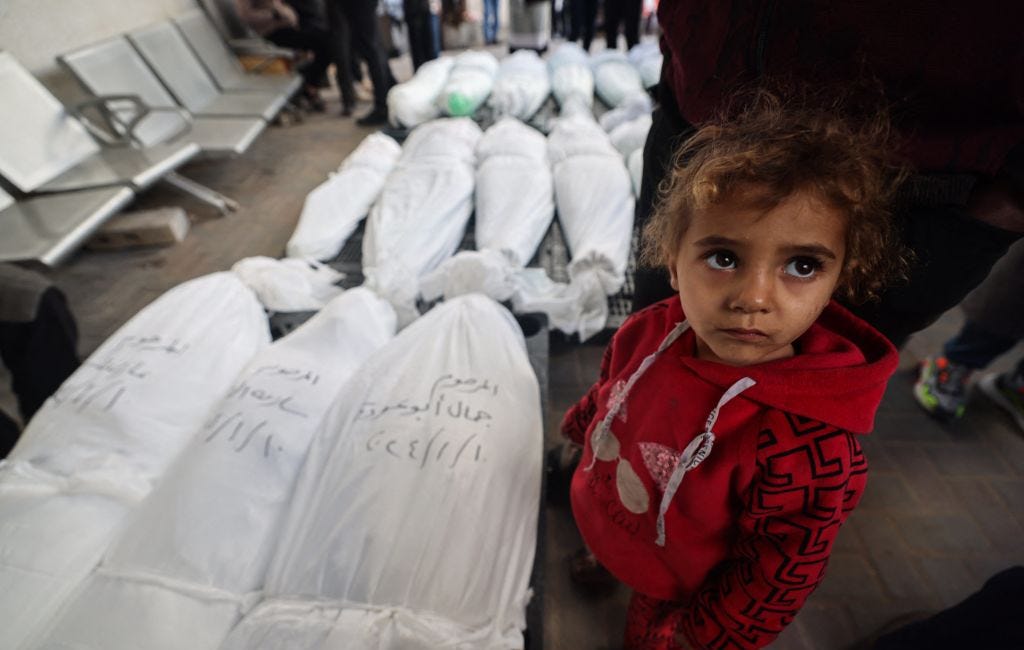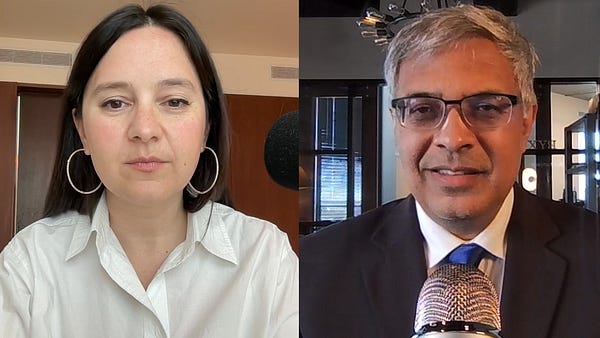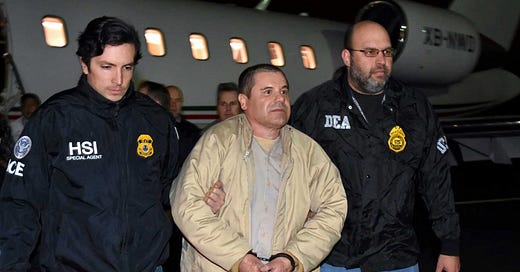
The Free Press

One hundred days ago, the world changed. October 7 has proven to be many things: the opening salvo in a brutal war between Israel and Hamas; an attack that could precipitate a broader, regional war; the beginning of a global, ongoing orgy of antisemitism; a moral test that many in the West have failed; a wake-up call regarding the rot inside the West’s once-great sensemaking institutions; a possible realignment of our politics.
Here at The Free Press, we’ve worked hard to capture the many threads of the story of October 7 and its aftermath, from life in wartime Israel and the reality on the ground in Gaza to the spillover effects in our newsrooms, classrooms, and lecture halls here in America. We’ve investigated the roots of the attackers’ hatred and their apologists’ moral relativism. We’ve looked at an unstable world through a wide-angle lens.
We’ve also tried not to lose sight of the acts of unspeakable barbarity that set all of this in motion. The Hamas terrorists who crossed into Israel killed 1,200 people and kidnapped 240 more. It was a day of mass murder, mass abduction, and mass rape, and we’ve spoken to families whose lives turned into horror stories 100 days ago today.

For many families, that nightmare still isn’t over. There are still 136 hostages in Gaza. Hamas has used the hundred-day milestone as an opportunity for macabre PR: yesterday they released proof-of-life videos of three hostages and announced that their fate will be revealed today.
Across the rest of the West, if not in Israel, the hostages have faded from view. And when it comes to the fate of the many young women abducted by Hamas and taken to Gaza, the silence from some corners has been deafening.
As Bari argues in a new monologue, the groups you would expect to care about these women and hostages—the prominent women’s organizations who protested loudly when it came to #MeToo, or Donald Trump, or Brett Kavanaugh—have said and done next to nothing about the murder, kidnap, and rape of Israeli girls.
What explains their silence—or worse, their downplaying and denial?
WATCH: THE SILENCE OF THE FEMINISTS
(If you prefer to listen instead of watch, click here.)
What We’ve Learned in 100 Days
Some of the most thought-provoking essays we’ve published over the last 100 days have been from people whose opinions we value explaining how the events of October 7—and the reaction to those events—have changed the way they understand the world.
Contributors like Konstantin Kisin, who wrote in The Free Press that October 7 was “The Day the Delusions Died.” Or Axel Springer CEO Mattias Döpfner, who listed for us “The Things I Never Thought Possible—Until October 7.” Or Ilan Benjamin, who explained: “Once, I Was a Peace Advocate. Now, I Have No Idealism Left.” Or Matti Friedman, who explained the sobering “Wisdom of Hamas.”
And so we asked six other people—voices from across the political spectrum —to answer a single question: What have you learned since October 7?
Here are their replies:
‘I can pretend to be a person when all I want to do is disappear’
Rachel Goldberg-Polin
I have learned about the depths of despair and the heights of compassion. I have learned there are no appropriate words in any language to describe the excruciating, throat-constricting dread I feel at all times from having my only son stolen from me. I have learned that I can pretend to be a person when all I want to do is disappear.
I now know that people can live without sleep, real sleep. I have discovered that I am part of a community so full of grace, generosity, and love, that they pick up and carry my soul when it’s crumpled on the floor. I now understand that strangers from all over the world can help give me a whisper of relief by sharing a kind word from afar. I have found out my husband is a champion, my daughters are resilient, and that I may be small but I can, and will, do whatever it takes to get my son back. And I have learned that my love for my beautiful Hersh continues to grow each day.
Rachel Goldberg-Polin is the mother of Hersh Goldberg-Polin, an Israeli-American hostage.
‘Jew-hatred has been revealed as a permanent and pervasive reality’
Michael Oren
War is the great clarifier. Issues and trends that might be clouded in peacetime become acutely clear in war. If, before Israel’s war in Gaza, Jews believed that antisemitism was an escalating yet still eradicable problem, the war has illuminated its vast, indelible dimensions.
Since October 7, the atrocities carried out by Hamas have been tolerated, contextualized, and hailed. Since October 7, Israel itself has been accused of perpetrating them and worse. All of this has brought a great and terrible clarity: Jew-hatred has been revealed as a permanent and pervasive reality in the West. Jews in America, especially, now have three choices: stay and fight, stay and hide, or move to Israel.
For Israelis, the war has dispelled the illusion that our state was secure behind its borders, functional in crises, and capable of defending itself by itself against any Middle Eastern threat. We learned that the Palestinians—the neighbors that some of us once regarded as future partners for peace—overwhelmingly supported the slaughter of the most peace-minded Israelis, while others either participated in or abetted that massacre.
More positively, we discovered that Israeli society was arguably the world’s strongest, able to resist near-intolerable strains and mobilize nationally for philanthropy and defense. Israelis, by contrast to American Jews, have only one choice: to fight and rebuild a state worthy of our society. For that clarity, we have the war to thank.
Michael Oren is a historian, former Israeli ambassador to the U.S., and the author, among other books, of “Six Days of War: June 1967 and the Making of the Modern Middle East.”
‘This feels existential’
Shadi Hamid
The war in Gaza isn’t just (or even primarily) about Gaza. I’ve come to see it as a proxy for a deeper set of civilizational fault lines, which makes all of this feel existential in a way few foreign policy debates have been.
In this reading, the war is about “civilization” versus “barbarism,” with Israel standing as an outpost of Western liberalism against an Arab and Muslim world with very different commitments. In this reading, Israel also serves as a stand-in against “woke” ideas that prioritize the rights and grievances of the powerless against the powerful.
The trouble with this reading is that it ignores the fact that there are actual victims—those who have found themselves stuck at the receiving end of history. As Edward Said memorably put it, the Palestinians are the “victims of the victims.”
For the past years I have broadly found myself aligned with the “anti-woke” camp, insofar as there is such a camp. But since October 7, anti-wokeness has become less appealing to me. If anti-wokeness results in an inability to acknowledge profound power imbalances and the suffering of the truly marginalized, then I’m not sure it’s a movement that makes sense for those of us who cannot reconcile ourselves to the violations Palestinians must endure daily.
In this sense, I’ve learned that my own ideological orientation is still in flux. Perhaps that’s the way it should be. While others found themselves veering to the right after October 7, I found myself moving in the other direction. It’s perhaps an odd place to be, but events—especially war—have a way of compelling us to question our own commitments.
Shadi Hamid is a columnist and editorial board member at The Washington Post. He is also the author of “The Problem of Democracy: America, the Middle East, and the Rise and Fall of an Idea.”
‘Our enemies meant what they said’
Einat Wilf
October 7 should put an end to any notion of “the poor Palestinians.” The massacre of that morning required years of massive investment in a formidable and fortified tunnel infrastructure, financial and economic planning, discipline, strategy, and vision—albeit a perverse kind.
For more than a century, Palestinians have tragically devoted themselves with singular dedication to one goal: that the Jewish people will not have their state anywhere in the historic land of Israel. Once that state was established, the goal remained the same, but the goalposts shifted: that the Jewish people will know not one day of peace until their country ceases to exist.
Hamas is but the most brutal and successful executor of the fundamental Palestinian goal. They planned their attack in full knowledge that it would be hugely popular among their people and that they would enjoy broad support by whatever anti-Jewish ideology prevails at the moment.
This should not have come as a surprise. The Palestinians have always been aided and abetted by every anti-Jewish ideology of the past century, whether it was Nazism in the 1930s and 1940s, Pan-Arabism in the 1950s and 1960s, Soviet Communism in the 1960s, 1970s, and 1980s, Sunni Jihadi Islamism in the 1990s and early 2000s, and now Shi’ite Jihadi Islamism and extreme Western progressivism, all of which have only ever been “pro-Palestinian” insofar as Palestinians fought the Jewish state.
And on October 7, Jews in Israel and Jews around the world woke up to their complacency, surprised once more that their enemies meant what they said.
Einat Wilf is a former Knesset member for the Labor Party and author of The War of Return: How Western Indulgence of the Palestinian Dream Has Obstructed the Path to Peace.
‘The appeal of universal principles has collapsed’
Bruno Maçães
What I did not know before October 7 is that most people—almost everyone—think in terms of “us and them” or “friend and enemy.” They first look to see who their friends and enemies are, then decide their views. This has been a rude awakening and a sore disappointment for me. The same actions committed by Russia and Israel—the same propaganda, the same gory videos—are judged differently simply because Israel is one of us and Russia is one of them. What I find so troubling is not just that the appeal of universal principles or the role of truth in politics has collapsed, but that so many people are cheering it on. It seems to me like people were tired of reason and truth. Such principles are too boring compared to the thrills of enmity and hatred.
Bruno Maçães is a columnist for the New Statesman, a former Portuguese Europe minister, and the author of “Geopolitics for the End Time.”
‘A test of fundamental theories and visions’
Haviv Rettig Gur
One hundred days is too long for the old model of Israeli-Palestinian clashes. Something new is afoot—a test of fundamental theories and visions.
When it set out on the morning of October 7 to kill and kidnap Israelis, Hamas knew what its actions would bring upon Gaza. And it welcomed it, not because Hamas are “extremist” or “radical”—easy but meaningless designations—but because it believes it is fighting a much larger fight than the Israeli-Palestinian one.
Hamas has a basic theory of Israel that is, at its heart, a theory of Islam. Muslim theologians have long wrestled with the problem of the Muslim world’s military, economic, and scientific weaknesses. Islam was born a conquering empire; the astonishing speed of its early conquests served for centuries as a favorite point of evidence for its divinity and truth. Modern-day Islamic weakness, then, implies to many ideologues an intolerable distancing between Muslims and their God.
The Jews, the Salafist theologian Rashid Rida wrote in 1898 in response to the First Zionist Congress, are “the penniless of the weakest of peoples, whom all governments are expelling.” If such weaklings can push back Islam, the problem of Islamic weakness reaches an intolerable breaking point.
This is why the Muslim world largely sat out the cataclysmic Houthi war in Yemen, which saw 85,000 children starved to death, or Assad’s butchery in Syria—but now marches in large numbers for Gaza. It is why an Iranian regime uninterested in rights for its own people engages in a long, expensive multifront war for “Palestinian rights.”
Iran did not build Hezbollah to not use it, nor the Houthis or its militias in Iraq and Syria. A war one side thinks is being fought to reclaim Islam’s rightful place in history will not end in Gaza. It has, alas, only just begun.
Haviv Rettig Gur is a senior analyst at The Times of Israel.
Finally, an essay that challenged several of our colleagues—and perhaps, you, too:
Andrew Sullivan is one of this country’s great independent thinkers. He’s allergic to tribalism and groupthink, perhaps because, as a gay Catholic and a conservative who makes the case for liberalism better than most liberals, he doesn’t really belong in any one tribe. This is part of what makes Andrew such an interesting and important writer.
Andrew is also far more critical of Israel than we tend to be. And one thing we’ve heard from you over the past three months is that you’d like to hear more debate on this subject in our pages.
All of which is why we thought to publish Andrew’s most recent essay from his must-read Substack The Weekly Dish. It is an example of Andrew’s writing at its best, and an important argument worth contending with as Israel’s war against Hamas wages on.
Become a Free Press subscriber today:























Why are so many Americans naive? The IDF takes a school yard- just a normal day in Isarel these days.
https://www.youtube.com/watch?v=3-w2cJSYbqI
I am retired military and was shocked at this. Hamas is despicable. Their punishment should be death. All of them. As soon as possible. They are a cancer to this earth. Kill them all, let God sort them out. Hamas leaders will likely sit on the right hand of Satan. Those that support Hamas, no matter where in this world, have tarnished souls and they will face judgement in the hereafter. Nothing can justify this attack. It's pure evil.